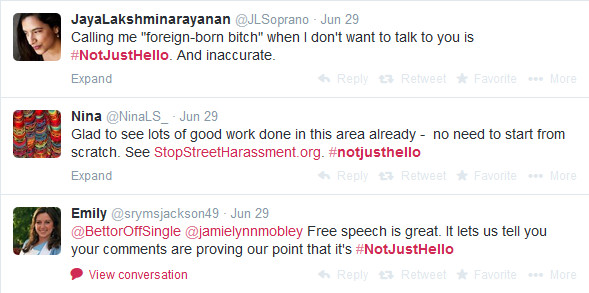Lorna M. Hartman, Spokane, WA, SSH Blog Correspondent
 Twitter has provided women worldwide with an avenue for mass sharing of harassment and assault experiences.
Twitter has provided women worldwide with an avenue for mass sharing of harassment and assault experiences.
It seems easy for some men to hear a story from a woman and simply dismiss it, as many women can testify. When hashtags go viral with dozens or even hundreds of women sharing these experiences, though, it’s much harder for people to simply dismiss them.
It’s harder to say, “You must have overreacted. It doesn’t sound like that big a deal,” when you’re saying it to several hundred or several thousand women from all over the world citing similar experiences.
Writer Aja Romano of The Daily Dot published “#NotJustHello identifies a troubling trend in street harassment” on June 22. She reported, “We’re sure Twitter user UJohnsmeyer probably meant well. But his defense of men who talk to women on the street may have sparked the weekend’s most engaging social commentary hashtag.”
Here’s a piece of the Twitter conversation that led to #NotJustHello:
@UJohnsmeyer @Feminist_Inti @Karnythia ever think that maybe a guy sees a chick he thinks is hot and just wants to try to start up a convo?
@Karnythia @UJohnsmeyer @Feminist_Inti Ever think women don’t want to strike up convos with strange men?
More women joined the conversation, telling about their experiences. Finally, @Karnythia said:
@Karnythia We do understand that it’s #NotJustHello right? That street harassment is never that calm or polite?
The new hashtag took off. Here are some samples of both women’s experiences, and of men’s reactions to the hashtag:
@dale_in_denver @KaeAltoBella @AJStream If there is an expectation of a response, then it’s #notjusthello. Ignoring isn’t working or this wouldn’t be a #.
@notallmikaylas Your desire to hit on me does not trump my right to be left alone. #NotJustHello
@hannaheff When I refused to acknowledge a stranger’s compliment, he invaded my personal space and said, “I’m stronger than you.” #NotJustHello
@UJohnsmeyer How do you get women if you can’t say hello to them? #notjusthello
@theamandabatty ‘Hello’ is a smile or a respectful nod, not a catcall, a jeer, a crude gesture or name calling when I don’t respond. #NotJustHello
@BettorOffSingle [this individual posted several dozen times, attempting to monopolize the hashtag—his post below is representative]
Hey stupid women: #yesallwomen #notjusthello #feminism all lesbian constructs for seducing gullible str8 women by turning them against men.
@cameralinds_ It’s #notjusthello, it’s fear of retaliation for both responding and not responding.
@RynJ21 It’s #NotJustHello when I have a smile I created specifically to deal with street harassment. I call it, “Please don’t kill me.”
Male allies posted as well:
@HolzmanTweed When I was a teen, a guy tried to “teach” me how to catcall, explaining “the rules:” (1/x) #NotJustHello
@HolzmanTweed He told me look for a ring, an ankle chain, something that flagged her as taken so that I wouldn’t disrespect her man. (2/x) #NotJustHello
@HolzmanTweed There’s no pretense on the guy side that it’s about anything but establishing & confirming power, a compliance check. #NotJustHello
@wisemath Brothers, go read the #NotJustHello tag. If that doesn’t move something in you, I’ll pray for you.
@RobScowen For the male “not allowed to flirt” whiners, please read #NotJustHello *carefully* without feeling like the [f******] victim and educate self
As some women tweeted, if men understood the humiliation and the fear women feel when they are harassed on the street, fewer men would do it. Women’s personal risk in possibly being verbally or physically assaulted by a displeased harasser is real.
Last September, blogger UnWinona told of one terrifying experience while commuting on the Metro in California.
On this occasion a bicyclist brought his bike in with him. Despite an empty car, he sat across from her. When he started talking to her, she calmly told him to leave her alone as she was reading.
He walked to his seat in a huff, muttering about it not being his fault she was pretty. But he didn’t stop there; he continued to mutter and complain, and after a few minutes he got back up and started pacing. Then he started screaming at her, and then punching the train.
She was terrified. She froze in her seat, ready with her feet up in case he attacked her, certain that if she got up and walked away she’d be attacked when she turned her back to leave.
For two stops he kept this up. No one came to her aid; no one even came to see what was happening. The second she reached her station, she ran out the door.
She concluded [emphasis hers], “So when people (men) want to talk about ‘legitimate’ forms of assault, tell girls they should be nice to strangers and give men the benefit of a doubt, tell them to consider it a compliment, tell them to ignore the bad behavior of men, I want them to be forced to feel, for even one minute, what it feels like to have so much verbal hatred and physical intimidation thrown at them for nothing more than being female and not wanting to share.”
Lorna is raising three young, kindhearted male allies and has worked on rape and interpersonal violence since the 1990s, including serving on the local rape hotline, answering calls, and driving to emergency rooms to advocate for victims and connect them with resources they needed.
